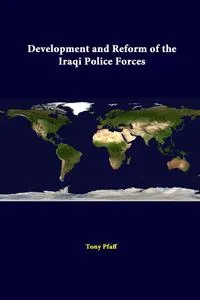Development And Reform Of The Iraqi Police Forces
Автор: Strategic Studies Institute
Переплёт: Мягкая обложка
📖 Nearly every week, newspapers carry stories of the failure of the Iraqi police to provide basic civil security for the citizens of Iraq. Despite millions of dollars in aid, equipment, education, and advisors, more than 4 years later police force development lags far behind the military. Numerous reasons are offered to account for this gap: corrupt practices left over from the previous regime, infiltration by militias, weak leadership, competition by better armed and organized criminal and militant groups, and so on. However, the military is also subject to these same influences, thus none of these explanations by themselves or in combination are satisfactory. But such an explanation is critical if policymakers and advisors are going to successfully facilitate police reform. This paper argues that the poor political and security environment impacts social, political, and cultural factors in ways that are predictable, understandable, and, with external help, resolvable.
Мнения
